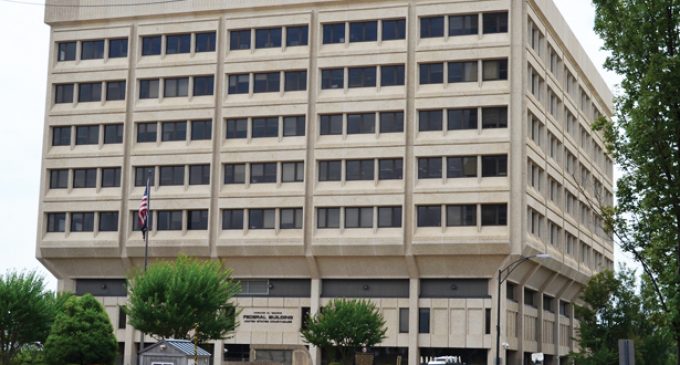Experts, voters discuss problems with N.C. voting law at trial

In above photo: Federal Building of Winston-Salem
The plaintiffs against North Carolina’s election reform law, known as House Bill 589, continue to present experts and voters in the N.C. NAACP vs. McCrory trial.
The trial began last week in federal court in Winston-Salem, challenging a series of state voting revisions signed into law in 2013 that reduced early voting days, banned out-of-precinct voting, ended same-day registration and stopped pre-registration for teens.
There’s also a voter ID requirement being challenged, but those arguments will be heard at a later date because a law was recently passed softening the ID requirements.
The plaintiffs – the N.C. NAACP, U.S. Justice Department and League of Women Voters – argue the law is discriminatory against minorities and youth.
Lawyers for the state argue that the measures are “neutral on their face” and are not discriminatory toward minorities.
In opening arguments on Monday, July 13, Penda Hair, a lawyer with the Advancement Project representing the N.C. NAACP, said that it’s the law’s results, not its neutral wording, that matter.
“Poll taxes were neutral on their face,” said Hair. “Literacy tests were neutral on their face. The law teaches it is the impact that matters – an impact that is linked to social and historical conditions – not whether a law explicitly says African-Americans or Latinos are not allowed to vote.”
The state also argued that every North Carolinian had the same opportunity to adapt to the voting changes.
Lawyers for the plaintiffs used a series of witnesses to establish that socioeconomic disadvantages exist for African-Americans.
These inequalities result in a higher likelihood of barriers like lack of education, transportation and Internet access that make it harder to adapt to voting restrictions.
“What may appear to be ‘equal’ costs imposed by a restriction on voting practices are, in fact, more acute for Black and Latino voters,” testified Barry Burden, a political science professor at the University of Wisconsin-Madison. “These groups are doubly burdened because they have fewer of the resources needed to overcome those costs and vote.”
When state lawyers pointed out that black turnout actually rose in the 2014 election despite the voting changes, Burden said there were a couple reasons for that, which probably won’t happen again.
One was the draw of the race between then U.S. Sen. Kay Hagan and Thom Tillis, which was the most expensive race in the country, inundating voters with non-stop advertising.
Another was the massive efforts to educate and mobilize voters by the N.C. NAACP and the Congressional Black Caucus.
Several expert witnesses testified that H.B. 589 curtailed voting practices disproportionally used by African-Americans like early voting, pre-registration and same day registration.
They also said the law changed from a 12-page bill on voter ID to a 40-page bill with sweeping changes after the U.S. Supreme Court struck down Section 5 of the Voting Rights Act, which required states and counties with a history of discrimination to get pre-clearance from the U.S. Justice Department for voting changes.
In regard to the voter fraud cited by lawmakers as a reason for House Bill 589, Dr. Morgan Kousser, a social science professor at the California Institute of Technology, said that between 2000 and 2013, there were only two cases of prosecuted voter fraud out of 12 million votes in the state.
“It is unlikely that proven voter fraud is a legitimate explanation for the adoption of the bill,” he said.
When asked by state attorneys if he could point out a legislator with discriminatory intent, Kousser said he didn’t find any “smoking guns.”
Witnesses testified to being disenfranchised by the law.
William Kittrell of Greensboro registered when he was 18 but had since moved and wasn’t aware he needed to change his registration.
After waiting in line to early vote in October 2014, he found out he wasn’t in the system.
Before changes in the law, he would’ve been able to do same day registration and vote.
“I waited to vote basically all my life,” he said. “I was disappointed and frustrated because my mom had always told me how important it was to vote.”
Witness Terrilin Cunningham of Concord testified she has a hectic life, which involves working three jobs and taking care of a sick church member.
When she squeezed in a stop for voting she was told she was in the wrong precinct.
She tried to cast a provisional ballet, which she later found out didn’t count because out of precinct voting is no longer allowed. Nadia Cohen of Cary, an 18 year-old who will be attending UNC Chapel Hill for college, missed the voting registration period for 2014.
She said she thought she could pre-register like her older brother had done and was caught unaware of the change until it was too late.
According to expert witness Dr. D. Sunshine Hillygus, a Duke University professor, states with pre-registration have a 13 percent increase in youth turnout.
The trial continues this week and is expected to last several weeks.











